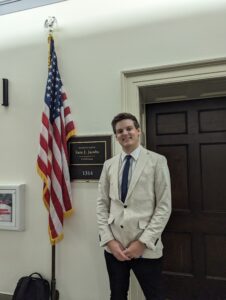September 22, 2023
Making waves on Capitol Hill
Posted by Caitlin Bergstrom
UC San Diego graduate student joins AGU event in Washington, D.C. to increase congressional visibility of and support for the geosciences
When I started my PhD in physical oceanography at Scripps Institution of Oceanography at UC San Diego wearing shorts and a tank top I never thought I would be turning up to Capitol Hill in a suit jacket and tie for meetings with members of Congress. But during last week’s Geosciences Congressional Visits Day that is exactly what I was doing.
The Geosciences Congressional Visits Day is a two-day event facilitated and sponsored by AGU (the American Geophysical Union). The first day is an in-person workshop to introduce and prepare attendees, while the second day consists of meetings with members of Congress (or more typically their staff) up on Capitol Hill. The event provides AGU members the ability to meet with legislators and emphasize the importance of federal geoscience funding – an important topic as robust and sustained investment in the geosciences helps to strengthen the economy and national security, upskill the workforce, and maintain the U.S. as a global leader in Earth and Ocean science.
As part of Team California (consisting of myself and three other AGU members), I met with staffers from the offices of Rep. Sara Jacobs (CA-51), Rep. Nancy Pelosi (CA-11), Sen. Dianne Feinstein, and Sen. Alex Padilla. In each meeting we put forward our ask – support geoscience research, education, and funding – and shared how our research that is funded by geoscience federal agencies is beneficial to California (obviously an important consideration for the offices we spoke with).
Each fiscal year, appropriations bills set funding levels for federal agencies such as NOAA, NASA, USGS, and NSF. This year’s congressional visits day (held on 13 and 14 September 2023) was very timely given the impending appropriations deadline of 30 September. If appropriation bills for fiscal year 2024 are not passed (i.e if funding levels for 2024 are not approved) then Congress will either issue temporary stop-gap funding (called a continuing resolution) to keep the government operational while funding debates continue, or – perish the thought – there is a government shutdown. Both alternatives have detrimental impacts on U.S.-funded science. A continuing resolution means that funding continues at the previous year’s level (essentially acting as a budget cut because inflation is not taken into account) and prevents federal agencies from starting new programs. A government shutdown is even more damaging, resulting in furloughs and a cessation of federally-funded science. Scientists who are out in the field are not immune to the impacts of a government shutdown with, for example, any U.S. research vessels at sea having to return home immediately. Delays in starting new research and shutdowns of ongoing research mean that a continuing resolution or government shutdown ultimately make science more expensive in the long-term.
While some members of Congress recognize the importance of science funding and some do not, it is still important to speak with all offices and bring geoscience to the table. If we aren’t meeting with congressional members and showing that constituents do care about science, you can sure bet that another group will happily take that meeting slot and lobby for other interests. As such, it is important that the geoscience community continues to engage with members of Congress and advocate on behalf of positive and progressive science funding and legislation.
Mitchell Chandler is an AGU member and PhD candidate at Scripps Institution of Oceanography at UC San Diego using Argo to study upper-ocean and deep-ocean western boundary currents. His work is supported by NOAA. You can find Mitchell on X/Twitter at @nz_mitch.

Team California (from left-to-right: Michael Redmond, Hasti Vahidi, Mitchell Chandler, Adam Cooper) outside the office of Sen. Dianne Feinstein (D-CA). Photo: Michael Redmond.


